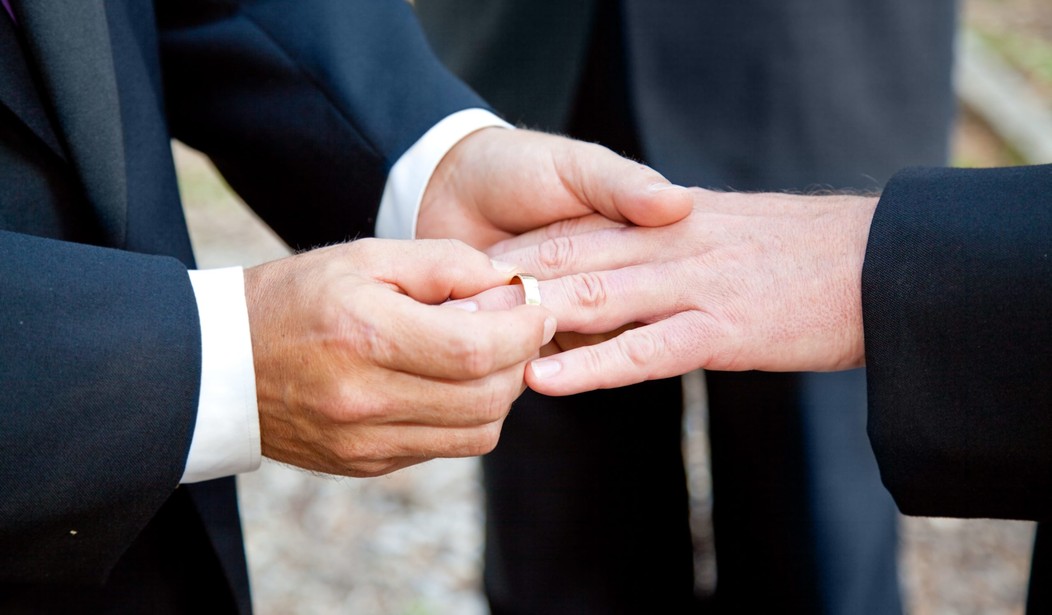Alabama Supreme Court justices refused on March 4 to overturn what they had done one year before, and thereby affirmed an order that state probate judges were bound by the state’s constitution to refuse to issue same-sex marriage licenses.
So conservatives won. Right?
That’s the way Liberty Counsel Chairman Mat Staver told PJM he sees it.
Staver is wrong, ACLU of Alabama Executive Director Susan Watson said to PJM. She claimed her side won because the Court refused to directly reject the U.S. Supreme Court’s decision legalizing gay marriage.
The Alabama Supreme Court issued an order on March 3, 2015, for Liberty Counsel’s Emergency Petition for Mandamus. The Court upheld the state’s marriage laws and ordered probate judges to cease issuing marriage licenses to same-sex couples.
PJM reported Moore told the state probate judges allowing gay marriage would be a violation of the state’s constitution.
“Alabama probate judges have a ministerial duty not to issue any marriage license contrary to the Alabama Sanctity of Marriage Amendment or the Alabama Marriage Protection Act,” Moore wrote in his order that was issued Jan. 6.
“Chief Justice Roy Moore is once again demonstrating that he is unfit to hold office,” Southern Poverty Law Center President Richard Cohen told PJM. “You would think after being removed from the bench once before that the chief justice would know better.”
Evidently not.
Probate Judge Don Davis asked to be relieved of the order because it would cause him to violate a federal court order that struck down the marriage law. On March 10, 2015, the Alabama Supreme Court issued a second order refusing to relieve him of the order and directing that he immediately cease issuing same-sex marriage licenses.
Two days later, the Alabama Supreme Court issued a third order directing that “all probate judges” in the state were subject to the March 3, 2015, order and that they must immediately cease issuing same-sex marriage licenses.
In June, the 5-4 opinion of the U.S. Supreme Court in the Obergefell marriage case was released. The ACLU then asked the Alabama Supreme Court to reverse its prior orders in light of the U.S. Supreme Court opinion.
Which brings us to March 4, 2016, and an Alabama Supreme Court decision that is as contentious as the case it was supposed to settle.
“The (March 4, 2016) judgment affirms the prior three orders of the Alabama Supreme Court, which ruled that the marriage laws remain valid and that the probate judges may not issue marriage licenses to same-sex couples,” Staver said. “The Court denied the ACLU’s request to have those orders reversed.”
Watson admitted the Alabama Supreme Court, or, at least, a number of the justices, disagreed vehemently with the U.S. Supreme Court’s decision that legalized gay marriage.
“But equally as clear, Alabama is bound by that decision and Alabama law prohibiting same-sex marriage is unconstitutional and unenforceable,” she said.
The Alabama Supreme Court also declined to force county clerks to put their names to gay marriage licenses.
Chief Justice Ray Moore, who ruled in 2015 that gay marriage was a violation of the Alabama Constitution, wrote this month in a 94-page concurring opinion that “five lawyers” on the U.S. Supreme Court in 2015 had “declared a new social policy for the entire country” with a “lawless” decision.
“Sodomy has never been and never will be an act by which a marriage can be consummated,” Moore wrote, and he declared gay relationships to be “unnatural.”
Moore also wrote that, as far as he was concerned, previous state orders barring gay marriage remained in effect and were valid under the federal Constitution.
Watson said if state probate judges decide Moore is right about the Alabama Constitution outweighing U.S. Supreme Court rulings, they could find still themselves on the wrong side of the bench.
“The great majority of counties have simply ignored Chief Justice Moore’s administrative order and the Alabama Supreme Court’s mandamus order,” Watson said. “Any county probate court judge that did so would find himself or herself in front of Judge (Callie V.) Granade (Senior U.S. District Court Judge for the Southern District of Alabama) on a contempt motion.”
Watson also stressed that, except for a few loose cannons still rolling around Alabama’s deck, the ACLU’s attorneys consider this case closed.
“There are the counties that have ceased issuing any marriage licenses, any of which could still be subject to potential legal action, but there are no counties that are issuing licenses to opposite-sex couples but not to same-sex couples,” she said. “I don’t think that we will see any change going forward.”
Staver isn’t so sure.
“There may be more litigation but if there is the Alabama Supreme Court has clearly spoken and I expect the same result,” Staver said. “Upholding the marriage laws.”
So, who actually won?
Southern Poverty Law Center’s Richard Cohen told al.com the decision is not like to “have any effect in the world other than to cause confusion.”
“(Chief) Justice Moore’s opinion is bizarre and disheartening,” Cohen added, “because it is completely lawless.”









Join the conversation as a VIP Member